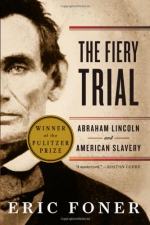
|
| Name: _________________________ | Period: ___________________ |
This test consists of 15 multiple choice questions and 5 short answer questions.
Multiple Choice Questions
1. Where was John C. Fremont commanding forces during the war and freeing the slaves of rebels whom he executed?
(a) Arkansas.
(b) Missouri.
(c) Tennessee.
(d) Kentucky.
2. What state asked to be entered into the Union as a separate state, agreeing that all black children born after July 1863 would be free?
(a) Virginia.
(b) North Carolina.
(c) Kentucky.
(d) West Virginia.
3. What candidate was presented by the Constitutional Union Party in the 1860 presidential election?
(a) John C. Bell.
(b) John P. Hale.
(c) Zachary Taylor.
(d) James Anderson.
4. What state had already mostly returned to Union control, so it was not named and was exempted from the Emancipation Proclamation?
(a) Arkansas.
(b) Tennessee.
(c) Texas.
(d) Kentucky.
5. What, also known as the Mason and Slidell Affair, was an international diplomatic incident that occurred during the American Civil War?
(a) The Mason Affair.
(b) The Trent Affair.
(c) The British Affair.
(d) The MSA.
6. Where was General Benjamin F. Butler assigned when he decided not to send a group of escape slaves back to their owners?
(a) Fort Wayne.
(b) Fort Amador.
(c) Fortress Monroe.
(d) Fortress Jackson.
7. When did Abraham Lincoln first meet with Frederick Douglass?
(a) September, 1864.
(b) June, 1865.
(c) August, 1863.
(d) September, 1862.
8. Who was a major general during the American Civil War and organized the famous Army of the Potomac?
(a) Andrew Gregg Curtin.
(b) Henry Clay.
(c) George B. McClellan.
(d) Zachary Taylor.
9. To Lincoln,abolishing slavery in what state was the most important step because it was the only state in the South in which he attempted to apply his plan for Reconstruction as he had in Missouri and Tennessee?
(a) Louisiana.
(b) Kentucky.
(c) Virginia.
(d) Kansas.
10. What refers to the act of withdrawing from an organization, union, or especially a political entity?
(a) Succession.
(b) Secession.
(c) Indiscretion.
(d) Embargo.
11. When did the Civil War in America end?
(a) 1866.
(b) 1860.
(c) 1861.
(d) 1865.
12. What was an act of Congress during the early months of the American Civil War permitting the confiscation of any of property, including slaves, being used to support the Confederate insurrection?
(a) The Confiscation Act of 1881.
(b) The Confiscation Act of 1865.
(c) The Confiscation Act of 1861.
(d) The Confiscation Act of 1850.
13. What is a foreign policy which holds that political rulers should avoid alliances with other nations, but still retain diplomacy, and avoid all wars not related to direct self-defense?
(a) Conventionalism.
(b) Conservative interventionalism.
(c) Non-interventionism.
(d) Diplomaticism.
14. In what year did West Virginia abolish slavery?
(a) 1865.
(b) 1795.
(c) 1864.
(d) 1831.
15. In order to get around the Emancipation Proclamation, Lincoln allowed states in the South to hold what in which he required a majority of citizens to vote?
(a) A congressional election.
(b) An all-black election.
(c) An open election.
(d) A nationwide caucus.
Short Answer Questions
1. When was Congress called to special session in which a bill was passed declaring the war had nothing to do with slavery but was being fought in order to preserve the Constitution?
2. In the context of the American Civil War, what refers to slave states that did not declare their secession from the United States before April 1861?
3. The Emancipation Proclamation proclaimed the freedom of how many of the nation's slaves?
4. Abraham Lincoln issued the Emancipation Proclamation under his authority as what under Article II, section 2 of the United States Constitution?
5. When did Lincoln issue a Preliminary Emancipation Proclamation?
|
This section contains 527 words (approx. 2 pages at 300 words per page) |

|




